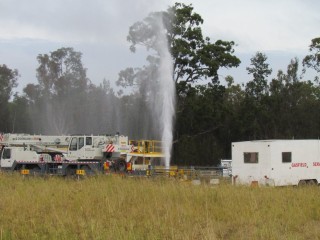Analysis
 As a coal seam gas company was racing yesterday to contain a fourth gas leak issue on the same Southern Queensland grazing property in five years, the NSW Government was unveiling a new policy to impose a 60 day moratorium on the granting of all new coal, coal seam gas and petroleum mining exploration licences in that state.
As a coal seam gas company was racing yesterday to contain a fourth gas leak issue on the same Southern Queensland grazing property in five years, the NSW Government was unveiling a new policy to impose a 60 day moratorium on the granting of all new coal, coal seam gas and petroleum mining exploration licences in that state.
The twin events in the same moment of time painted a telling contrast between the differing approaches of two State Governments to CSG development.
The Queensland Government’s approach has been criticised by landholders for its policy of approving large-scale developments and then regulating on the run, and for dismissing community calls for a pause on new development until greater regulatory protections for environmental and agricultural assets are in place.
In contrast the recently elected NSW Government has applied the brakes on the approval of new mining exploration tenures, which already cover more than half the state’s land area, to consider how land use conflicts between mining, agricultural and conservation sectors can be resolved.
Queensland’s Basin Sustainability Alliance, a coalition of landholder groups fighting for better protections of land and water in the Surat Basin region, said yesterday that despite the advanced state of CSG projects in Queensland, the State Government was still yet to develop comprehensive standards governing the drilling of gas in the state.
While the Queensland government had stringent legislated requirements governing the drilling of artesian water bores, it did not yet apply the same conditions to the drilling of gas wells.
“Drilling for CSG is much more dangerous than drilling for water because of the depth, water pressures and the presence of methane gas at such extremely high pressures,” BSA chairman and Dalby farmer Ian Hayllor said.
“You can’t help but wonder why the government has approved the drilling of up to 40,000 CSG wells without even bothering to legislate drilling standards.”
In NSW, planning and infrastructure minister Brad Hazzard said the O'Farrell coalition Government had delivered on a pre-election commitment to introduce a Strategic Regional Land Use policy.
The policy was designed to "strike a balance between the agricultural, mining, energy and conservation sectors", he said.
The transitional measures in the policy included:
- an immediate 60-day moratorium on the granting of new coal, coal seam gas, and petroleum exploration licences in NSW;
- A requirement that all applications for coal, coal seam gas, and petroleum exploration licences be exhibited for public comment;
- The public notification of guidelines which will inform the assessment of impacts on strategic agricultural land from proposed development activities;
- A requirement that all new coal, coal seam gas, and petroleum extraction applications must be accompanied by an Agricultural Impact Statement;
- The exhibition of an Aquifer Interference Regulation for public comment – which once implemented, will introduce a suite of new measures to better regulate activities that impact on aquifers; and
- A stakeholder reference group consisting of the key agricultural, industrial and conservation groups will be established to advise on the policy’s development and implementation.
Mr Hazzard said that the transitional measures would underpin the development of a comprehensive framework to oversee the management of competing land uses across regional areas of NSW.
Strategies tailored to each specific region will govern where drilling can proceed and where it can not to protect the State’s future food security.
"We want to ensure that these arrangements deliver on our commitments in relation to strategic land use, and balance the need for investment certainty with conservation of high value strategic agricultural land."
The NSW Farmers Association welcomed the imposition of a 60 day moratorium as a clear sign the NSW Government was taking the concerns of farmers about the protection of food producing resources seriously.
NSW mining industry representatives questioned the need for a moratorium, saying that it could place millions of dollars of export projects at risk, but also voiced support for the development of a new approach to avoid conflict over valuable land.
Mr Hazzard said the planned measures would also give miner’s certainty by replacing previous polices that allowed miners to invest millions of dollars paying for exploration licenses and initial development processes with no guarantee that they would be allowed to mine.



HAVE YOUR SAY